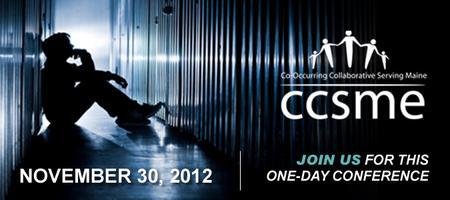Expanding Mentoring in Maine: Support for Re-Entry from Corrections

Expanding Mentoring in Maine: Support for Re-Entry from Corrections
Conference: Expanding Mentoring in Maine: Support for Re-Entry from Corrections
Friday, Nov 30, 2012
Saint Joseph's College, Standish
[ult_blockquote align=”” cite=”” color=”” bcolor=”” ]Mentoring is defined as a relationship over a prolonged period of time between two or more people where caring volunteer mentors assist those re-entering from the correctional system in successfully and permanently reentering their communities by providing consistent support as needed, guidance, and encouragement that impacts the participants in developing positive social relationships and achieving such outcomes as job retention, family reunification, reduced recidivism, etc.
Adapted from Coffey Consulting, 2009
[/ult_blockquote]
The imprisonment boom and the focus on incapacitation as a goal of punishment over the past 30 years has led us to reconsider how we respond to the fact that 95% of people in jail and prison will get out at some point. Since the turn of the 20th century, the criminal justice system, federal and state governments, and local communities have attempted to develop approaches to the reentry process. The Second Chance Act is one mechanism by which the federal government has attempted to ensure a safe and successful return of people who were formerly incarcerated through reentry initiatives focused on employment, housing, substance abuse, as well as children and family services. One important and often under-studied initiative is the various mentoring programs that are used in conjunction with other reentry programs.
This conference explored models of mentoring practiced here in Maine and around New England and highlighted the work of the Mentor ME project, a collaborative project by Co-Occurring Collaborative Serving Maine, the Cumberland County Sheriff’s Office, My Sister’s Keeper, Goodwill Industries of Northern New England, and Saint Joseph’s College of Maine. The project is funded by a Second Chance BJA grant.
Tags: Correctional Issues. Resource Categories: Brochures, Conference Materials, and Workshops & Trainings. Conferences: 2012 • Expanding Mentoring in Maine.
[ult_blockquote align=”” cite=”” color=”” bcolor=”” ]Mentoring is defined as a relationship over a prolonged period of time between two or more people where caring volunteer mentors assist those re-entering from the correctional system in successfully and permanently reentering their communities by providing consistent support as needed, guidance, and encouragement that impacts the participants in developing positive social relationships and achieving such outcomes as job retention, family reunification, reduced recidivism, etc.
Adapted from Coffey Consulting, 2009
[/ult_blockquote]
The imprisonment boom and the focus on incapacitation as a goal of punishment over the past 30 years has led us to reconsider how we respond to the fact that 95% of people in jail and prison will get out at some point. Since the turn of the 20th century, the criminal justice system, federal and state governments, and local communities have attempted to develop approaches to the reentry process. The Second Chance Act is one mechanism by which the federal government has attempted to ensure a safe and successful return of people who were formerly incarcerated through reentry initiatives focused on employment, housing, substance abuse, as well as children and family services. One important and often under-studied initiative is the various mentoring programs that are used in conjunction with other reentry programs.
This conference explored models of mentoring practiced here in Maine and around New England and highlighted the work of the Mentor ME project, a collaborative project by Co-Occurring Collaborative Serving Maine, the Cumberland County Sheriff’s Office, My Sister’s Keeper, Goodwill Industries of Northern New England, and Saint Joseph’s College of Maine. The project is funded by a Second Chance BJA grant.
Filter By Subject
- Anxiety (3)
- Attention Deficit Hyperactivity Disorder (3)
- Autism (2)
- Bipolar Disorder (4)
- Borderline Personality Disorder (1)
- Brain Development (2)
- Correctional Issues (25)
- Depression (5)
- Eating Disorders (2)
- Integration/Integrated Care (11)
- LGBTQ+ (6)
- ME SUD Learning Community (34)
- Medication-assisted Treatment (9)
- Mental Health (130)
- Opioids (33)
- Peer-to-Peer (31)
- Pharmacology (5)
- Recovery (28)
- Reentry (1)
- SBIRT (15)
- Self-Help (33)
- Stress (2)
- Substance Use (102)
- Suicide (6)
- Suicide Prevention (104)
- Support Groups (15)
- Technical Assistance (2)
- Tobacco (9)
- Training/Education/Handbooks (5)
- Trauma (27)
- Youth (29)
Filter By Conference
- 2017 • Summit on Opioid and Other Substance Use Disorder (1)
- 2017 • Annual Membership Meeting (13)
- 2016 • Integrating Tobacco Treatment (7)
- 2016 • HOPE Conference (11)
- 2016 • Beyond the Basics in Suicide Prevention (23)
- 2015 • DSM-X: A Look into the Future of Behavioral Health Care (5)
- 2015 • Beyond the Basics in Suicide Prevention (15)
- 2015 • Annual Membership Meeting (27)
- 2014 • Beyond the Basics in Suicide Prevention (16)
- 2014 • Annual Membership Meeting (1)
- 2013 • Rx Generation (14)
- 2013 • Beyond the Basics in Suicide Prevention (11)
- 2012 • The Assessment and Clinical Management of Suicidal Clients (13)
- 2012 • Making it Work: Implementing Seeking Safety (4)
- 2012 • Expanding Mentoring in Maine (17)
- 2012 • Beyond the Basics in Suicide Prevention (15)
- 2012 • Alternatives to Medication (25)
- 2011 • Complexities of Trauma (14)
